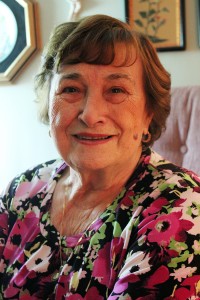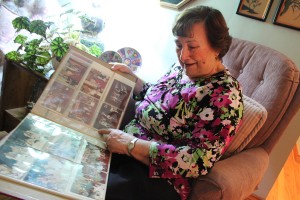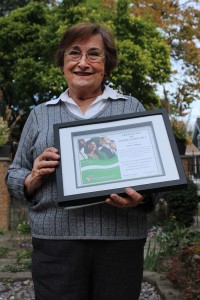The Story of Carrousel


Ann Thier, founder of Carrousel of Nations, sits for a photo in her home in Windsor on Dec. 4, 2015. Photo by Taylor Busch.
As a young Yugoslavian girl who spent most of the first 14 years of her life living in children’s hospitals, transition camps and in war-torn Germany, Ann Thier did not think she would live past her 30s.
Now widowed, 80 and living in the one of the most culturally diverse parts of Canada, she is part of an elite group of people who have earned the right to say they’ve changed Windsor, Ont. for the better.
She was and always will be the originator, planner and defender of one of city’s most engaging and unique festivals: The Carrousel of Nations.
Carrousel is recognized as Ontario’s longest running cultural festival. For 41 years it has drawn thousands of visitors to the region over three weekends in June seemingly with ease but according to Thier, this was not always the case.
“The first year was a year of bickering,” says Thier. “People didn’t know what I wanted, so I quit in the middle of ’74. I said, ‘When you come to your senses you let me know what you want.’”
She was brought up to be a fighter from an early age, and her determination served her well while sitting on various cultural councils that eventually became Windsor’s Multicultural Council.
Thier was born in 1935 in a part of Yugoslavia that was soon taken over by Germany. There, she lived with her parents and younger sister until she turned seven and the family was forced to move into the “Russian part of Germany” and live in multiple transition camps as they waited for passage to Canada. Before she could turn nine, Thier had spent 16 months bedridden in a children’s hospital with a severe illness that appeared to be incurable.
“I think I had Leukemia because they would take blood work every day and they gave me all kinds of crazy medicine and the doctors said I would never reach 40,” says Their.
In 1949, her family was approved to fly out of Kiel, Germany with an American air lift. They spent a short time in one last camp in Hanover before embarking on a two-month voyage to Canada. Once arrived, her family lived with the relatives who sponsored them for one year. They worked for free on their farm during the day and learned basic English at night at Harrow High School.
When they moved to Windsor in 1951, Thier says her family became heavily involved in St. Michael’s Catholic Church where she soon met and married her husband. Though they did not become members of the German Teutonia Club until the mid-60s, she remembers seeing their booth in Jackson Park at Windsor’s first Freedom Festival as a teenager.
“The Freedom Festival actually started as a folk festival in the 50s when the Iron Curtain was still up,” says Their. “They wanted to start something to protest [on behalf of] all the countries being held down by the Communists, so they called it Freedom Festival of the Captive Nations. That’s how it started and a few years after that they moved it [from Michigan] to Windsor and shortened it to Freedom Fest.”

Ann Thier flips through photos of the first Carrousel of Nations in her home in Windsor on Dec. 12, 2015. Photo by Taylor Busch.
She recalls watching the ethnic groups parade down Ouellette Avenue to Jackson Park each year where they played music, served ethnic food and had cultural displays in wooden booths. In those days, the festival was mainly organized by the Windsor Ethnic Council, which was renamed the Canadian All Nations Cultural Association (CANCA) in the late 60s and became the Multicultural Council of Windsor and Essex County in 1972.
Thier says she was asked to represent the Teutonia Club on the council in 1968, and within two years became its president.
“It was easy to get on the board then, it was just being on the board that was difficult,” laughs Thier.
She says the council continued participating in Freedom Fest and Canada Day celebrations fully into the late 70s, but certain members started thinking about throwing their own festival more than a decade earlier when they began having issues with the city and other groups.
“When I joined there was a lot of disputes, there was a lot of anger with Freedom Festival because they called us, ‘those Ethnics,’ and we didn’t like it too much,” says Thier. “We were still doing Freedom Festival heart and soul but it was always in the back of our minds to have our own folk festival.”
During that time, she also became a member of the Folk Arts Council of Ontario and attended dozens of cultural events across the province with Teutonia’s dance groups. She says those experiences taught her how to plan a successful festival if the council ever got the money to put on their own.
Then, in 1972 while attending a conference in Ottawa for the Folk Arts Council, she heard about a new federal grant for ethnic groups and quickly drew up a proposal for the Windsor-Essex Multicultural Council when she returned.
“I was so excited because I was still chair of my ethnic groups at that time and I knew I wanted to be villages,” says Their. “So I made a proposal to the board of my idea and we didn’t know what we were going to call it, but I already had a concept in my head.”
With the support of nearly 30 ethnic clubs from around the city and several other groups, the council appointed Thier to lead the first Carrousel committee. For many months she worked day and night with her team helping the ethnic clubs fill out applications for the grant, but she says became more and more frustrated when some members of the team began favouring other groups. This led to her brief resignation from the committee and council in the months leading up to the first Carrousel, which she can laugh about now.

Ann Thier stands in her backyard with an award she recently received from the Multicultural Council for her forty years of service Oct. 23, 2015. Photo by Taylor Busch.
When she returned, the rest of the year flew by faster than any other. Though the committee had to create everything from scratch, they somehow found time to organize more Carrousel events than any other year. Before she knew it, June had come and she finally got to see her dream come to life at 40, the year she never thought she would live to.
“You think of it and it’s funny and it’s sad and it’s happy,” says Thier. “It was such a good year.”
Since those days, Thier admits she volunteered less with the council because she does not agree with many of the changes they have made. However, she has returned a few times to help out when asked.
“Overall it has diminished as far as I’m concerned. It has less of the cultural aspect,” says Thier. “Now it’s the new wave of music and entertainment and stuff and the clubs that still have their own buildings has become less and less so it’s mostly food and entertainment and very little cultural thing.”
Patricia Reid-Crichton, Co-Chair of Carrousel by the River, met Thier for the first time at a general meeting this year and says she was impressed by her ideas. Though she admits the festival has changed a bit over the years, she remains confident it will last another 40 years and beyond because there are many of upcoming, young Carrousel enthusiasts who will make sure Thier’s vision continues.
“As long as new immigrants continue to come to this community there will always be a need for the kind of long-lasting friendships and lineage that can only come from attending festivals like Carrousel of Nations and joining clubs like the ones in Windsor,” says Reid-Crichton.
Though she has volunteered with Carrousel for more than 30 years, Reid-Crichton says she still gets excited every December when her committee begins meeting regularly to discuss possible changes to the festival. She says their main focus this year is finding new ways to reverse the steep decline in villages and attendees that has been happening since the early 2000s.
“I feel we need to go back. I feel like we need to go back to our roots of people and be more simplified so that we attract all the cultures down there,” says Reid-Crichton.
Heather Grondin, 30, has danced in Carrousel most of her life and makes a point to attend multiple villages each summer, but says many could use better promotion. (which group is she with? What is her heritage?) She also thinks some villages would see higher numbers if they were to offer more modern music and entertainment through the festival’s days and nights.
“Just a little bit more advertising would be nice,” says Grondin. “I just really like the atmosphere like spending time with my friends and my family. I would hate to see it not continue.”
Reid-Crichton says finding good entertainment has never been a problem for the festival, but hopes to take things up a notch this year by having more local groups perform at the riverfront and creating a new, cross culture dance. She says it is more important than ever for the ethnic clubs to build bond since many of them are struggling so stay open and may one day need to share one cultural center.
“We already know it’s just a matter of time… I would say in another 5 to 10 years maybe depending on how many more of them drop off,” says Reid-Crichton. “We’re definitely going to need to do something because we do want to keep the culture alive in Windsor, the history of the culture at least.”
Thier says she would not mind sharing a hall with other groups when the Teutonia Club closes because she has continued to maintain good relationships with the few surviving, committee members. She also says she would like to see the Multicultural Council bring back more elements of the first Carrousel such as parades, fashion shows, cultural displays and concerts.
“I’m grateful that it’s still here and it still exists because it’s important for our youth to know where we came from and the council, they have to remember if they touch just one youth person then that’s enough. Because that’s what it’s always been about,” says Thier. “I want to see them continue for as long as I am around and my children and my grandchildren and so on and so on.”


